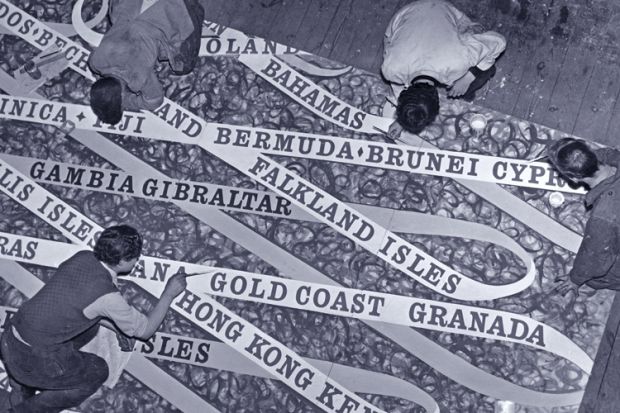Source: Getty
Commonwealth of letters: the ACU helped universities across the British empire to stay connected in the post-colonial era
Ahead of the Association of Commonwealth Universities’ centenary conference at the University of London next week, a new book celebrates the history and continuing relevance of “the oldest higher education network in modern history”.
Issued by Sage Publications, Universities for a New World: Making a Global Network in International Higher Education, 1913-2013 looks back to the first meeting of the body, originally known as the Universities Bureau of the British Empire. Its membership “comprised universities of Britain and those of the dominions and colonies, many constructed along the lines of the ‘mother country’”.
The organisation had to change radically to adapt to the growth of post- war “new universities” and the decline of empire, changing its name to the ACU in 1963.
The book’s editor, Deryck M. Schreuder, now visiting professor in the University of Sydney’s Faculty of Education and Social Work, has served as vice-chancellor of two Australian universities. In the preface, he recalls how his own life has been shaped by the Commonwealth university system. Even as a child “attending a very modest government school in the small and nondescript frontier town of Ndola, situated in deep central Africa”, he followed a curriculum “set in England by the overseas extension board…established by London University”.
His African university “owed its origins to the expansion of the ‘London model’”, while scholarships later took him to a number of major Commonwealth universities and a career spanning four continents.
Today, he writes, “the Commonwealth university story provides a vantage point for viewing…wider global changes” to the sector.
Contributors to the book explore the ACU’s history; the impact of e- learning and greater student mobility; the challenges facing Commonwealth nations in Africa, Asia, Australia and the Caribbean; and the prospects for the future.
Peter Williams, honorary secretary of the Commonwealth Consortium for Education, proposes a new “Commonwealth higher education agenda for the twenty-first century”.
From the late 1970s, he recalls, “higher education slipped down the agenda of many bilateral and international agencies”. It might have disappeared from Commonwealth thinking if the decision by the British Conservative government in 1980 to introduce full-cost fees for overseas students had not had such a “far-reaching” impact.
The United Nations’ Millennium Development Goals’ welcome stress on primary schooling and gender in education also led to the comparative neglect of the academy. Progress in these areas has now opened up opportunities for Commonwealth agencies. While they could do little to improve standards in dozens of small primary schools operating in indigenous languages, Professor Williams believes they have more to contribute in higher education, where institutions often use English and use transnational curricula.
If education is at the heart of Commonwealth links, he concludes, it is at the tertiary level that agencies are well positioned to promote “the reinvigoration of Commonwealth relationships and connections”.




